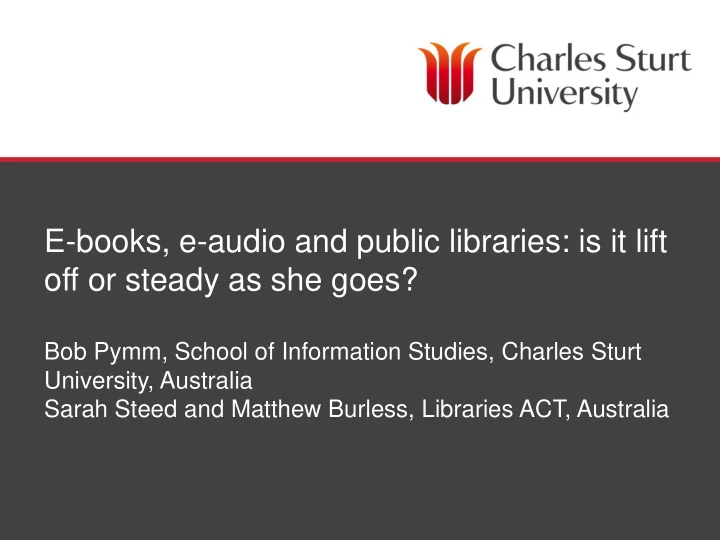

E-books, e-audio and public libraries: is it lift off or steady as she goes? Bob Pymm, School of Information Studies, Charles Sturt University, Australia Sarah Steed and Matthew Burless, Libraries ACT, Australia SCHOOL OF INFORMATION STUDIES
Growth in the e-book market • In US – Jan 2011 66million e-books sold; Jan 2012, 99.5 million • In UK – 366% increase for same period • In Australia – 72% with sales at $35 million • Print book sales fall in UK (to 2003 levels) and by 9% in the US BUT • Conflicting figures and huge success of POD. SCHOOL OF INFORMATION STUDIES
Christmas 2011 • For the first time over half of the top 50 bestsellers in the US were e-books • 1.33 million e-readers sold in the UK during December 2011 • Huge growth in YA and childrens • Enhanced Harry Potter e-books sold directly (Pottermore); bypass publishers SCHOOL OF INFORMATION STUDIES
Who is reading e-books? • In the UK as at March 2012, overall 30% of males, 25% of females have read a digital book. SCHOOL OF INFORMATION STUDIES
Who is reading e-books? • In the US, 23% of adults had read an e- book in 2012 • 33% owned a tablet device or e-reader • 67% reported reading a print book (down from 72% in 2011) SCHOOL OF INFORMATION STUDIES
For publishers • Amazon claim (2011) e-book sales outstrip print sales and well above paperbacks • Barnes and Noble (Christmas 2011) – e- book sales three times those of print • Overall, the publishing majors reporting e- formats 15-20% of total sales (2011) • Huge predominance of English language e-books; sales tiny outside Anglo world SCHOOL OF INFORMATION STUDIES
Take up by libraries • Trials since late 1990s • Small scale until 2006 on • Focus on users downloading to their own devices (readers and mp3 players) – with a minority loaning hardware • Take up of e-audio was faster than e-books SCHOOL OF INFORMATION STUDIES
In libraries today • Library Journal survey (2011): • 82% of US public libraries now offer e-books • Collections grown by 185% over the previous year • Circulation more than doubled on 2010 • 76% of librarians thought e-book availability brought new borrowers into the system • 95% expected circulation to increase in 2012. SCHOOL OF INFORMATION STUDIES
Australian public library system • Canberra (Australia’s capital) • Population c 360,000 • 200,000 registered with public library system • 2.9 million borrowings (2011) • High per capita income • 80%+ broadband penetration SCHOOL OF INFORMATION STUDIES
E-formats in Libraries ACT • Introduced in 2006 (using Overdrive software) • 1750 titles – split 50/50 books and audio • Users had to use their own PC, reader or player • No real promotion SCHOOL OF INFORMATION STUDIES
Circulation 2006-2011 SCHOOL OF INFORMATION STUDIES
Borrowers SCHOOL OF INFORMATION STUDIES
Annual acquisitions of e-formats SCHOOL OF INFORMATION STUDIES
Discussion • Numbers are very small compared to print collection and traditional borrowing • 2011 saw e-books overtake e-audio for the first time • Limited Australian titles available – some publishers (eg. Penguin, Macmillan) pulled their e-pubs out of the library market SCHOOL OF INFORMATION STUDIES
Discussion (cont.) • Collection still small which limits borrowing potential • Restrictions eg. cannot download to Kindle in Australia • And restrictive circulation module – once a title is ‘checked out’ it is unavailable to others for two or three weeks. SCHOOL OF INFORMATION STUDIES
Top e-book titles • Similar to print materials • 2011 – no. 1 is Bill Bryson (same in print) and one of only two non-fiction titles in the top 50. • A large preponderance of romance titles, plus a few classics (eg. The Hobbit) SCHOOL OF INFORMATION STUDIES
Top e-audio titles • A broader mix than e-books • Bill Bryson still no. 1 • A complete mix – romance, crime modern classics and traditional classics. • Still more fiction SCHOOL OF INFORMATION STUDIES
Closing thoughts • Commercial e-book market led by Kindle – but unable to be used in Australian libraries • If this is resolved (as in the US) expect a spurt in uptake • Budgeting an issue – small numbers but is it a Catch 22...a bigger collection would equal greater borrowing? SCHOOL OF INFORMATION STUDIES
Closing thoughts (cont.) • Libraries ACT focus on content – not hardware – a good one and means more money for collection building • Appeal seems to be wide-ranging though need for more research here • Steady growth fuelled by word of mouth seems appropriate approach but potential for e-book reading groups etc SCHOOL OF INFORMATION STUDIES
Closing thoughts (cont.) • Potential to engage local community – collect their stories literally – the possibility of a self- publishing option (works for Amazon) • Continued role for e-audio • In conclusion it will be a slow evolution, not revolution, but it is growing and libraries do need to be part of that growth and juggle their budgets accordingly. SCHOOL OF INFORMATION STUDIES
Recommend
More recommend